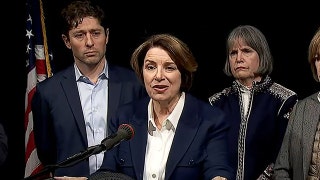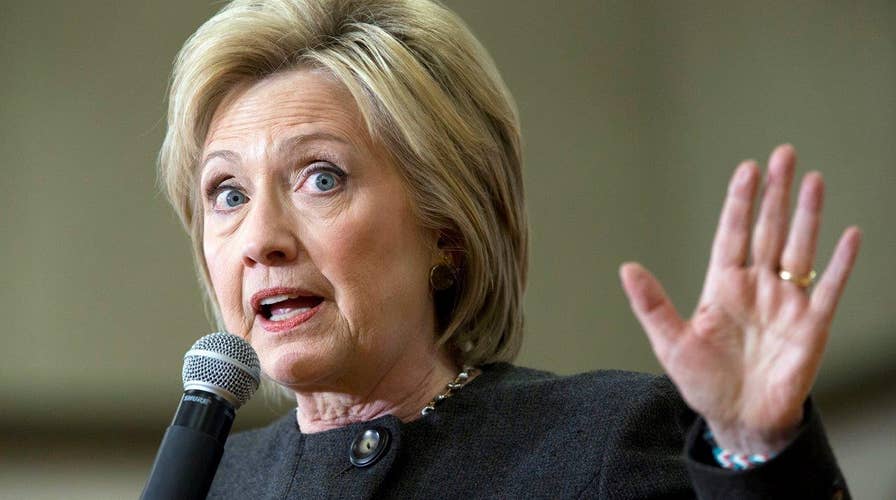FBI going directly to intel agencies in Clinton email probe
Catherine Herridge reports on investigation
Hillary Clinton’s email headaches grew Friday as the State Department confirmed several emails under review contain information too “top secret” to release in any form – while at the same time delaying the release of thousands of other pages.
The department released roughly 1,700 pages of emails Friday evening. But the latest developments fueled Republican allegations – just three days before the Iowa caucuses – that Clinton was “irresponsible” in her email use, and that the department she used to lead is still trying to protect her by dragging out the process until after the start of primary contests.
Fox News first reported earlier Friday that some emails were “too damaging” to national security to release.
The State Department formally announced Friday afternoon that seven email chains, found in 22 documents, will be withheld “in full” because they, in fact, contain “Top Secret” information. In addition, a spokesman said another 18 emails between President Obama and Clinton will be withheld for now – but they are “not classified” and will be released eventually.
Clinton campaign spokesman Brian Fallon pushed back, though, criticizing the intelligence community for flagging those emails.
"We firmly oppose the complete blocking of the release of these emails,” he said in a statement. "This appears to be over-classification run amok. We will pursue all appropriate avenues to see that her emails are released in a manner consistent with her call last year."
The more than 1,000 pages that were released, though, are a fraction of the total remaining number.
Among the 1,670 pages released Friday evening, 242 emails were upgraded to classified; 11 of which were considered 'secret'.
One email from January 2013 included intelligence from three other government agencies, the Defense Intelligence Agency, National Reconnaissance Office and National Geospatial Intelligence Agency. The NRO and NGA are both satellite and mapping agencies, with which the State Department does not have jurisdiction over classification of information.
The agency that generates the intelligence, owns the information, and therefore has final say on classification.
The latest batch of released emails also contained a few examples of some State Department employees not understanding the classification system and its protocols.
On April 25, 2012 Clifford Hart, then U.S. special envoy for six-party talks on North Korea's nuclear program, sent an email that reads, "sensitive but unclassified" but is then heavily redacted and classified.
In a court filing Thursday night, the State Department said it would not make the Jan. 29 release deadline -- and about 7,000 pages still needed to be sent out for “interagency consultation.” The agency acknowledged these pages had been “missed” and not sent out for review earlier.
The filing drew Republican complaints.
“The notion that a months-long process could be hit with 11th hour delays reeks of political favoritism designed to hide the ball from voters on the eve of early state voting,” Republican National Committee Chairman Reince Priebus said in a statement. “Voters deserve to know the facts before they cast their ballots, not after.”
The Iowa caucuses are Monday, followed by the New Hampshire primary a week after that, and Clinton is locked in a tight race for the Democratic presidential nomination with Vermont Sen. Bernie Sanders. The first four contests will be over by the end of February.
The department, though, in part tried to blame the blizzard for the delay.
“Since discovering its oversight, State has moved diligently to process the documents and send them to the appropriate agencies for review, a process that was interrupted by the blizzard that struck Washington, D.C. over the weekend,” the agency noted in the filing, which asked for a 30-day extension.
The agency has produced some 43,000 pages of emails in last several months. There were two dumps totaling 6,000 in January. While hundreds of these documents were retroactively classified, Fox News first reported that this included emails classified at a level beyond “top secret.”
A Jan. 14 letter from Intelligence Community Inspector General I. Charles McCullough III to senior lawmakers said a review identified “several dozen” additional classified emails -- including specific intelligence from “special access programs (SAP),” which indicates a level higher than “top secret.”
In an interview with NPR, Clinton claimed the latest IG finding doesn’t change anything and suggested it was politically motivated. She has claimed that the emails found on her private server and email were “innocuous” and never classified at the time.
But after the State Department confirmed some emails are so secret they’re being withheld in full, Republicans seized on the announcement.
“We now know Hillary Clinton’s use of a personal email account during her tenure at the State Department wasn’t just negligent, it was completely dangerous,” Sen. Tom Cotton, R-Ark., said in a statement. “To put our country in danger for personal convenience is arrogant and irresponsible — and it’s illegal.
She should face the same consequences that any federal employee who behaved similarly would face, including criminal prosecution.”
An FBI investigation remains underway into Clinton’s email practices.
Asked Friday whether Clinton would not be indicted, White House Press Secretary Josh Earnest said it does not appear the investigation is headed in that direction.
But a law enforcement source close to the DOJ investigation pushed back on those remarks, telling Fox News the investigation is still very much ongoing – and a decision has not been made on the matter one way or the other.
Meanwhile, State Department spokesman John Kirby reiterated Friday that the 22 documents in question were “not marked classified at the time they were sent.”
But he said the State Department will look at “whether they were classified at the time they were sent.”
He said: “These emails will be denied in full, meaning they will not be produced online on our FOIA website. In response to a FOIA request, it is not unusual to deny or withhold a document in full. We are not going to speak to the content of these documents.”
Fox News’ Catherine Herridge, Matthew Dean, Lucas Tomlinson and Kelly Chernenkoff contributed to this report.













































